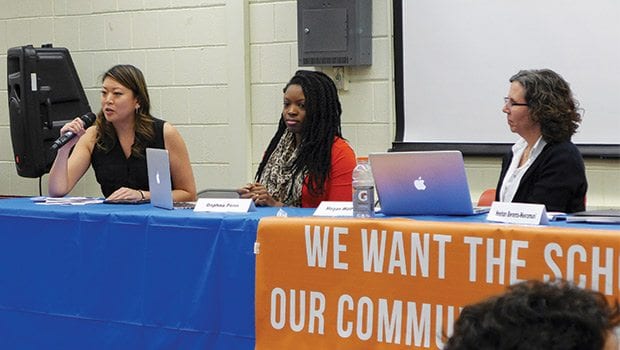BPS budget fears spur call to action
Parents, activists gather for emergency meeting

Parents, grandparents, students, educators, administrators and education activists filled Madison Park High School’s Cardinal Hall last Thursday, with dozens standing when the seats ran out. Their purpose: an emergency town hall meeting to address, “What is the Future for Public Schools in Boston?”
Government officials were there as well, including city Councilors Tito Jackson, Ayanna Pressley and Timothy McCarthy, along with representatives from state Senators Sonia Chang-Diaz and Linda Dorcena Forry and Councilor Andrea Campbell.
The Boston Education Justice Alliance convened the meeting. Activists outlined the trials facing Boston Public Schools, high among them the estimated $50 million budget debt, drainage of money to charters, over-testing and policies regarded as being forced on families and communities instead of inspired by their needs.
The year brings decisive deadlines with the School Committee reviewing the budget February-March, the unified enrollment system for vote in June and the possible November ballot question regarding the charter cap lift— if charter advocates do not succeed in pushing the state Senate to act before then.
Marléna Rose, BEJA campaign coordinator, presented Boston’s movement as part of a nationwide fight for to secure equal and sufficient funding for public schools.
“Across the nation schools and students are being faced with unsustainable budget cuts,” Rose said.
Presenters called for actions ranging from appealing to elected officials and testifying at public hearings to walk-outs.
Budget strains and charter ballots
Heshan Berents-Weeramuni, co-chair of the Citywide Parent Council and BPS parent, outlined likely impacts of the budget shortfall, including losses of librarians, science teachers and accreditation at some schools and reduced services for students with autism and emotional impairments.
Several activists said the potential lift of the charter cap would only further cash-strap BPS by shifting more funds to charter schools. This in turn creates a cycle: as funds move, more cuts to resources and teachers reduce BPS performance, causing more people to turn to better-funded charters as the only viable option.
“In this rush to talk about parent choice, my choice to choose BPS is being taken away from me,” Berents-Weeramuni said.

Marléna Rose, Boston Education Justice Alliance campaign coordinator, convened the meeting. She called the cuts to public school budgets “unsustainable.”
Boston’s property problem
Sources of the funding gap include incomplete reimbursement to BPS for students who go to charters, stagnation of Chapter 70 funding while costs rise and a failure to fully tap potential property tax revenue even in the midst of a building boom, Berents-Weeramuni said.
After state officials determine how much funds a school needs to operate, the state provides a certain percent, notifies the local district how much it must contribute and directs state monies to fill any gap. District contribution levels are set based on the local income and property values. In Boston, property values are high and luxury buildings are shooting up — but this wealth is under-tapped, Berents-Weeramuni said.
Property tax exemptions apply to many nonprofits, including major universities, museums and hospitals, which own 51 percent of the city’s real estate, Berents-Weeramuni said. While Boston officials request that nonprofits holding $15 million or more in property pay a voluntary fee in lieu of taxes, this does not always happen. In fiscal year 2015, the city only received 68.6 percent of the requested amount, according to information on the City of Boston website.
Proposition 2 1/2 —a law enacted in 1982 that limits annual increases in property tax to 2.5 percent — further reduces available revenues. Add to that the rate of inflation, which outstrips 2.5 percent, thus making this a smaller and smaller pool, he said.
Unified enrollment questions
Several speakers targeted the Boston Compact’s unified enrollment proposal, which would fold charter enrollment into BPS’s current system. Rose and others said that there has been a lack of transparency and information to parents about the implications.
Megan Wolf, BPS parent and member of Quality Education for Every Student, said that the new system is being pushed before analysis of BPS’s current, home base, system has been released — something MIT researchers are scheduled to do in February.
Both Daphne Penn, a Union of Minority Neighborhoods volunteer and former teacher, and Wolf said that, too often, solutions have focused on enrollment policies and moving students to different schools, instead of improving schools.
Parent, student action
Rose said a major issue has been lack of community voice in education policy. Speakers called for attendees to make their voice heard as many measures come up for vote.
“Families and communities are being subjected to policies that are being pushed top-down instead of bottom up,” Rose said.
On Feb. 3 the School Committee receives the proposed BPS budget and has until March 23 to consider and amend it, at which point the committee votes. On April 6, the budget goes to City Council and they vote on June 30. Both the School Committee and City Council are required to hold public hearings so that parents and activists can have their say.
The School Committee votes on unified enrollment in June. Meanwhile, campaigns continue apace both for and against lifting the charter cap.






